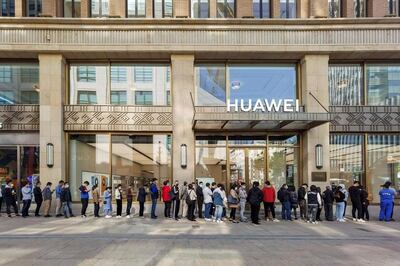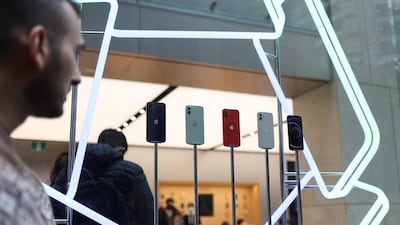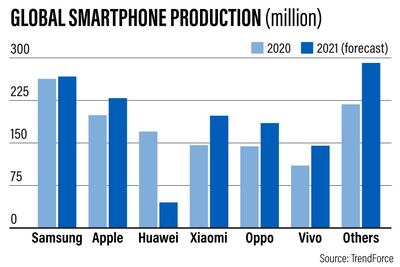Global smartphone production is projected to increase by almost 9 per cent to 1.36 billion units in 2021, after it fell 11 per cent year-on-year in 2020 amid the pandemic-induced economic slowdown, according to a new report.
Only1.25 billion smartphones were produced globally last year, as Covid-19 hit discretionary spending and upended supply chains of phone manufacturers, Taipei-based market intelligence firm TrendForce said in its latest findings.
“Market will gradually recover as people become accustomed to the new normal resulting from the pandemic,” it said
This year will see a “strong wave of device replacement demand” as well as “demand growth in the emerging markets”.
South Korean manufacturer Samsung led the industry with almost 21 per cent market share in 2020, producing 263 million handsets last year. It was followed by the US technology giant Apple, which made 199 million handsets, and Chinese brand Huawei, with 170 million handsets, grabbing 16 per cent and 14 per cent market share, respectively.
Shenzhen-based Huawei, which for the first time reached the number one position in the smartphone industry with 20 per cent market share in the second quarter of last year, is expected to see a significant decline in smartphone manufacturing this year.
Its inability to secure enough crucial components and software needed to manufacture smartphones and US restrictions on the company, will drive down production. TrendForce predicts Huawei to slip from the third place in 2020 to the seventh spot this year.
“This is because of the effects of the US export restrictions and the spin-off of Honor as a separate entity operating in the smartphone market,” it said.
Last November, Huawei sold its Honor smartphone business to a Chinese government-backed consortium for an undisclosed amount.
The top six smartphone makers in 2021 will be Samsung, Apple, Xiaomi, Oppo, Vivo, and Transsion. Together, they will account for almost 80 per cent of the global smartphone market.
Looking forward, the research firm said the Covid-19 pandemic will remain the “central variable or the biggest uncertainty” in the smartphone industry.
“It will continue to exert significant influence on the global economy. Besides the pandemic, the performance of smartphone brands during 2021 could also be affected by geopolitical instabilities and the lack of available production capacity in the semiconductor foundry market,” it added.
With the wider rollout of fifth-generation network expected this year, the penetration rate of 5G smartphones is likely to rise to 37 per cent in 2021, to about 500 million units.
“Thanks to the Chinese government’s aggressive push for 5G commercialisation in 2020, global 5G smartphone production reached about 240 million units [in 2020], a 19 per cent penetration rate … with Chinese brands accounting for almost a 60 per cent market share,” according to the TrendForce report.
However, the next wave of demand for 5G devices is expected to come from North America and Europe, areas with relatively big installed base of Apple users.
“There is large pent-up demand for 5G upgrades, especially within the iOS base, which is now getting converted into sales", Varun Mishra, research analyst at Counterpoint Research, said
"This was complemented by strong carrier promos, especially in the US, which accounted for more than one-third of the iPhone 12 and 12 Pro sales in October.”
Apple launched its first 5G-enabled iPhone 12 series in October, while its main competitors Samsung and Huawei launched their first models in 2019.
Benefits of first-time home buyers' scheme
- Priority access to new homes from participating developers
- Discounts on sales price of off-plan units
- Flexible payment plans from developers
- Mortgages with better interest rates, faster approval times and reduced fees
- DLD registration fee can be paid through banks or credit cards at zero interest rates
COMPANY PROFILE
Founders: Alhaan Ahmed, Alyina Ahmed and Maximo Tettamanzi
Total funding: Self funded
Quick pearls of wisdom
Focus on gratitude: And do so deeply, he says. “Think of one to three things a day that you’re grateful for. It needs to be specific, too, don’t just say ‘air.’ Really think about it. If you’re grateful for, say, what your parents have done for you, that will motivate you to do more for the world.”
Know how to fight: Shetty married his wife, Radhi, three years ago (he met her in a meditation class before he went off and became a monk). He says they’ve had to learn to respect each other’s “fighting styles” – he’s a talk it-out-immediately person, while she needs space to think. “When you’re having an argument, remember, it’s not you against each other. It’s both of you against the problem. When you win, they lose. If you’re on a team you have to win together.”
RIDE%20ON
%3Cp%3EDirector%3A%20Larry%20Yang%3C%2Fp%3E%0A%3Cp%3EStars%3A%20Jackie%20Chan%2C%20Liu%20Haocun%2C%20Kevin%20Guo%3C%2Fp%3E%0A%3Cp%3ERating%3A%202%2F5%3C%2Fp%3E%0A
Israel Palestine on Swedish TV 1958-1989
Director: Goran Hugo Olsson
Rating: 5/5
TYPES%20OF%20ONLINE%20GIG%20WORK
%3Cp%3E%3Cstrong%3EDesign%2C%20multimedia%20and%20creative%20work%3A%20%3C%2Fstrong%3ELogo%20design%2C%20website%20design%2C%20visualisations%3C%2Fp%3E%0A%3Cp%3E%3Cstrong%3EBusiness%20and%20professional%20management%3A%20%3C%2Fstrong%3ELegal%20or%20management%20consulting%2C%20architecture%3C%2Fp%3E%0A%3Cp%3E%3Cstrong%3EBusiness%20and%20professional%20support%3A%20%3C%2Fstrong%3EResearch%20support%2C%20proofreading%2C%20bookkeeping%3C%2Fp%3E%0A%3Cp%3E%3Cstrong%3ESales%20and%20marketing%20support%3A%20%3C%2Fstrong%3ESearch%20engine%20optimisation%2C%20social%20media%20marketing%3C%2Fp%3E%0A%3Cp%3E%3Cstrong%3EData%20entry%2C%20administrative%2C%20and%20clerical%3A%20%3C%2Fstrong%3EData%20entry%20tasks%2C%20virtual%20assistants%3C%2Fp%3E%0A%3Cp%3E%3Cstrong%3EIT%2C%20software%20development%20and%20tech%3A%20%3C%2Fstrong%3EData%20analyst%2C%20back-end%20or%20front-end%20developers%3C%2Fp%3E%0A%3Cp%3E%3Cstrong%3EWriting%20and%20translation%3A%20%3C%2Fstrong%3EContent%20writing%2C%20ghost%20writing%2C%20translation%3C%2Fp%3E%0A%3Cp%3E%3Cstrong%3EOnline%20microtasks%3A%20%3C%2Fstrong%3EImage%20tagging%2C%20surveys%3C%2Fp%3E%0A%3Cp%3E%3Cem%3ESource%3A%20World%20Bank%3C%2Fem%3E%3C%2Fp%3E%0A
Terror attacks in Paris, November 13, 2015
- At 9.16pm, three suicide attackers killed one person outside the Atade de France during a foootball match between France and Germany
- At 9.25pm, three attackers opened fire on restaurants and cafes over 20 minutes, killing 39 people
- Shortly after 9.40pm, three other attackers launched a three-hour raid on the Bataclan, in which 1,500 people had gathered to watch a rock concert. In total, 90 people were killed
- Salah Abdeslam, the only survivor of the terrorists, did not directly participate in the attacks, thought to be due to a technical glitch in his suicide vest
- He fled to Belgium and was involved in attacks on Brussels in March 2016. He is serving a life sentence in France
The Bio
Hometown: Bogota, Colombia
Favourite place to relax in UAE: the desert around Al Mleiha in Sharjah or the eastern mangroves in Abu Dhabi
The one book everyone should read: 100 Years of Solitude by Gabriel Garcia Marquez. It will make your mind fly
Favourite documentary: Chasing Coral by Jeff Orlowski. It's a good reality check about one of the most valued ecosystems for humanity
Ms Yang's top tips for parents new to the UAE
- Join parent networks
- Look beyond school fees
- Keep an open mind
GAC GS8 Specs
Engine: 2.0-litre 4cyl turbo
Power: 248hp at 5,200rpm
Torque: 400Nm at 1,750-4,000rpm
Transmission: 8-speed auto
Fuel consumption: 9.1L/100km
On sale: Now
Price: From Dh149,900
Groom and Two Brides
Director: Elie Semaan
Starring: Abdullah Boushehri, Laila Abdallah, Lulwa Almulla
Rating: 3/5
Specs
Engine: Duel electric motors
Power: 659hp
Torque: 1075Nm
On sale: Available for pre-order now
Price: On request
FIGHT INFO
Men’s 60kg Round 1:
Ahmad Shuja Jamal (AFG) beat Krisada Takhiankliang (THA) - points
Hyan Aljmyah (SYR) beat Akram Alyminee (YEM) - retired Round 1
Ibrahim Bilal (UAE) beat Bhanu Pratap Pandit (IND) - TKO Round 1
Men’s 71kg Round 1:
Seyed Kaveh Soleyman (IRI) beat Abedel Rahman (JOR) - RSC round 3.
Amine Al Moatassime (UAE) walk over Ritiz Puri (NEP)
PREMIER LEAGUE FIXTURES
All times UAE ( 4 GMT)
Saturday
West Ham United v Tottenham Hotspur (3.30pm)
Burnley v Huddersfield Town (7pm)
Everton v Bournemouth (7pm)
Manchester City v Crystal Palace (7pm)
Southampton v Manchester United (7pm)
Stoke City v Chelsea (7pm)
Swansea City v Watford (7pm)
Leicester City v Liverpool (8.30pm)
Sunday
Brighton and Hove Albion v Newcastle United (7pm)
Monday
Arsenal v West Bromwich Albion (11pm)
The%20specs
%3Cp%3E%3Cstrong%3EEngine%3A%20%3C%2Fstrong%3ESingle%20front-axle%20electric%20motor%3Cbr%3E%3Cstrong%3EPower%3A%20%3C%2Fstrong%3E218hp%3Cbr%3E%3Cstrong%3ETorque%3A%20%3C%2Fstrong%3E330Nm%3Cbr%3E%3Cstrong%3ETransmission%3A%20%3C%2Fstrong%3ESingle-speed%20automatic%3Cbr%3E%3Cstrong%3EMax%20touring%20range%3A%20%3C%2Fstrong%3E402km%20(claimed)%3Cbr%3E%3Cstrong%3EPrice%3A%20%3C%2Fstrong%3EFrom%20Dh215%2C000%20(estimate)%3Cbr%3E%3Cstrong%3EOn%20sale%3A%20%3C%2Fstrong%3ESeptember%3C%2Fp%3E%0A
UAE currency: the story behind the money in your pockets
UAE currency: the story behind the money in your pockets
Getting%20there%20
%3Cp%3E%3Ca%20href%3D%22https%3A%2F%2Fwww.thenationalnews.com%2Ftravel%2F2023%2F01%2F12%2Fwhat-does-it-take-to-be-cabin-crew-at-one-of-the-worlds-best-airlines-in-2023%2F%22%20target%3D%22_self%22%3EEtihad%20Airways%20%3C%2Fa%3Eflies%20daily%20to%20the%20Maldives%20from%20Abu%20Dhabi.%20The%20journey%20takes%20four%20hours%20and%20return%20fares%20start%20from%20Dh3%2C995.%20Opt%20for%20the%203am%20flight%20and%20you%E2%80%99ll%20land%20at%206am%2C%20giving%20you%20the%20entire%20day%20to%20adjust%20to%20island%20time.%20%C2%A0%3C%2Fp%3E%0A%3Cp%3ERound%20trip%20speedboat%20transfers%20to%20the%20resort%20are%20bookable%20via%20Anantara%20and%20cost%20%24265%20per%20person.%20%C2%A0%3C%2Fp%3E%0A
All about the Sevens
Cape Town Sevens on Saturday and Sunday: Pools A – South Africa, Kenya, France, Russia; B – New Zealand, Australia, Spain, United States; C – England, Scotland, Argentina, Uganda; D – Fiji, Samoa, Canada, Wales
HSBC World Sevens Series standing after first leg in Dubai 1 South Africa; 2 New Zealand; 3 England; 4 Fiji; 5 Australia; 6 Samoa; 7 Kenya; 8 Scotland; 9 France; 10 Spain; 11 Argentina; 12 Canada; 13 Wales; 14 Uganda; 15 United States; 16 Russia





